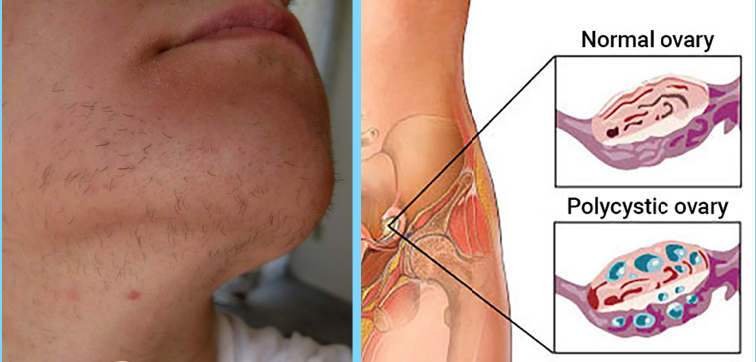Affecting women at reproductive age, polycystic ovary syndrome is a gynecological disorder, mainly due to hormonal disruptions. This disease, although very common, remains little known to women. Focus on its causes and symptoms.
The ovaries are part of the reproductive organs. They play a very important role in this system because they are in charge of ovulation but also the secretion of female hormones, including progesterone and estrogen.
Polycystic ovary syndrome (PCOS) is a very common gynecological disease that affects the ovaries. Caused by a hormonal disorder, an overproduction of androgens (male hormones), PCOS occurs in 5 to 10% of women of fertile age and causes the development of cysts to the ovaries.
The causes of Polycystic Ovarian Syndrome:
PCOS, or polycystic ovarian disease, ovarian dystrophy or Stein-Leveinthal syndrome, of its other medical names, may have various causes.
This condition is mainly caused by dysfunction of the pituitary gland and the hypothalamus. However, other factors may also be responsible for the occurrence of this disease, namely:
- Heredity
- Exposure to endocrine disrupters
- High levels of insulin
How to recognize Polycystic Ovarian Syndrome?
This gynecological condition manifests itself in several symptoms which may be of different intensity. In general, women who suffer from this problem are prone to excessive hairiness, acne, weight gain that can go as far as obesity, lack of menstruation or an irregular cycle and fertility problems continued To anovulation due to this disease.
Excessive hairiness and irregular periods, however, remain the most common signs of PCOS. Infertility, on the other hand, affects 75% of women with this disease, while obesity affects 50% of them.
But although the symptoms of PCOS are quite visible, its diagnosis remains difficult, since its signs can be confused with those of other pathologies. Thus, before confirming that the patient has polycystic ovarian syndrome, the physician must eliminate these other diseases, including hypothyroidism, adrenal hyperplasia, hyperthyroidism or a tumor.
The doctor should also check if the patient has an absence of menstruation, hyperandrogenism and polycystic ovaries after doing an ecography. Note that the ovary can have 5-8 micro-follicles of less than 10 mm each.
Polycystic ovary syndrome, what complications?
Women with PCOS are more likely to suffer from certain diseases, including heart disease, hypertension and diabetes. These are very related to obesity, one of the signs of polycystic ovary syndrome, but can also manifest in non-obese people.
These facts were corroborated by an Australian scientific study published in the Journal of Clinical Endocrinology & Metabolism. Research suggests that women with polycystic ovary syndrome have higher risks of metabolic and cardiovascular problems that may lead to hospitalization. They are also more likely to have infertility problems, being more stressed, or experiencing episodes of depression and anxiety.
According to the study, women with PCOS have twice as much hospitalization compared to women who do not suffer from PCOS.
Cancer of the endometrium may also be one of the complications of PCOS. Indeed, following irregular menstruation, the lining of the uterus thickens over the long term and cancer cells can develop.
Polycystic ovary syndrome, an incurable disease:
As with many other diseases, PCOS is a condition that can not be cured. Doctors prescribe appropriate treatments to reduce the symptoms that accompany this gynecological disease.
For example :
To fight obesity and restore the balance of hormones, patients are required to make changes in their eating habits and must do regular sporting activities.
To alleviate the problem of excessive hair growth, associated with high levels of androgens, antiandrogens are prescribed
Women who wish to get pregnant, must have medical follow-up to treat the problems of infertility, which result from this disease. Note, however, that the difficulty to conceive is not systematic. Beautiful


